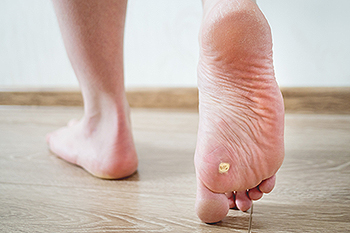
Plantar warts, though usually harmless, can be quite bothersome. These skin growths typically appear on the soles of your feet and can be painful, especially when walking. They are caused by a virus that accelerates the growth of the top layer of skin, resulting in the formation of warts. While plantar warts generally disappear on their own over months or even years, they can be a source of discomfort and concern. These warts are extremely contagious and can spread easily. Not only can you re-infect yourself by touching a wart and then another part of your body, but you can also transmit the virus to others by sharing personal items, like towels or socks. In most cases, plantar warts do not require treatment. However, if they cause you pain or multiply, it is suggested that you schedule an appointment with a podiatrist for an accurate diagnosis and treatment.
Plantar warts can be very uncomfortable. If you need your feet checked, contact one of our podiatrists from Jill Einhorn, DPM and James Einhorn, DPM. Our doctors will assist you with all of your foot and ankle needs.
About Plantar Warts
Plantar warts are the result of HPV, or human papillomavirus, getting into open wounds on the feet. They are mostly found on the heels or balls of the feet.
While plantar warts are generally harmless, those experiencing excessive pain or those suffering from diabetes or a compromised immune system require immediate medical care. Plantar warts are easily diagnosed, usually through scraping off a bit of rough skin or by getting a biopsy.
Symptoms
Treatment
To help prevent developing plantar warts, avoid walking barefoot over abrasive surfaces that can cause cuts or wounds for HPV to get into. Avoiding direct contact with other warts, as well as not picking or rubbing existing warts, can help prevent the further spread of plantar warts. However, if you think you have developed plantar warts, speak to your podiatrist. He or she can diagnose the warts on your feet and recommend the appropriate treatment options.
If you have any questions please feel free to contact our offices located in Brooklyn and Astoria, NY . We offer the newest diagnostic and treatment technologies for all your foot and ankle needs.